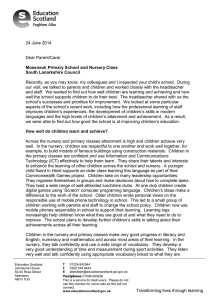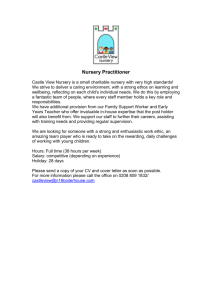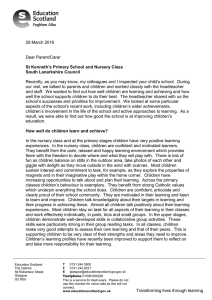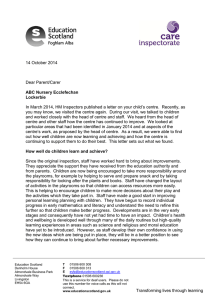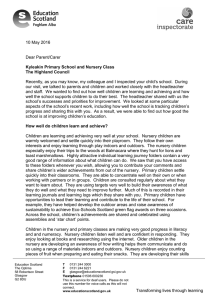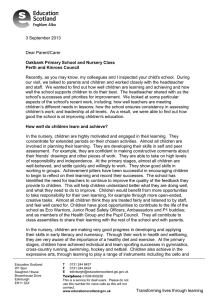28 October 2014 Dear Parent/Carer ’s school. During
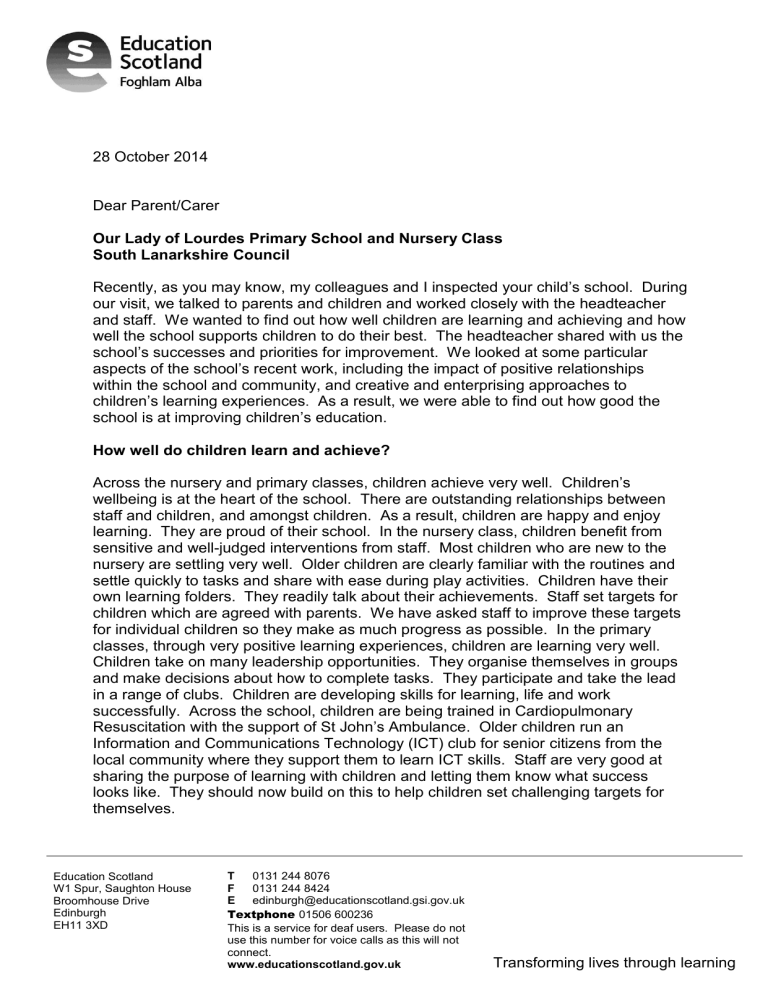
28 October 2014
Dear Parent/Carer
Our Lady of Lourdes Primary School and Nursery Class
South Lanarkshire Council
Recently, as you may know, my colleagues and I inspected your child ’s school. During our visit, we talked to parents and children and worked closely with the headteacher and staff. We wanted to find out how well children are learning and achieving and how well the school supports children to do their best. The headteacher shared with us the school ’s successes and priorities for improvement. We looked at some particular aspects of the school
’s recent work, including the impact of positive relationships within the school and community, and creative and enterprising approaches to children’s learning experiences
.
As a result, we were able to find out how good the school is at improving children ’s education.
How well do children learn and achieve?
Across the nursery and primary classes, children achieve very well.
Children’s wellbeing is at the heart of the school. There are outstanding relationships between staff and children, and amongst children. As a result, children are happy and enjoy learning. They are proud of their school. In the nursery class, children benefit from sensitive and well-judged interventions from staff. Most children who are new to the nursery are settling very well. Older children are clearly familiar with the routines and settle quickly to tasks and share with ease during play activities. Children have their own learning folders. They readily talk about their achievements. Staff set targets for children which are agreed with parents. We have asked staff to improve these targets for individual children so they make as much progress as possible. In the primary classes, through very positive learning experiences, children are learning very well.
Children take on many leadership opportunities. They organise themselves in groups and make decisions about how to complete tasks. They participate and take the lead in a range of clubs. Children are developing skills for learning, life and work successfully. Across the school, children are being trained in Cardiopulmonary
Resuscitation with the support of St John’s Ambulance. Older children run an
Information and Communications Technology (ICT) club for senior citizens from the local community where they support them to learn ICT skills. Staff are very good at sharing the purpose of learning with children and letting them know what success looks like. They should now build on this to help children set challenging targets for themselves.
Education Scotland
W1 Spur, Saughton House
Broomhouse Drive
Edinburgh
EH11 3XD
T 0131 244 8076
F 0131 244 8424
E edinburgh@educationscotland.gsi.gov.uk
Textphone
01506 600236
This is a service for deaf users. Please do not use this number for voice calls as this will not connect. www.educationscotland.gov.uk
Transforming lives through learning
Children in the nursery and primary classes are making very good progress in literacy and English, numeracy and mathematics and across most areas of their learning. In the nursery, most children express their thoughts and opinions clearly. They are able to listen to and follow instructions. Almost all children explore texts in books. They enthusiastically retell their favourite stories. Children are developing good skills in sorting, matching and counting. Older children use and explore numbers in their play.
Across the primary classes, children are articulate and enjoy reading. They write well for a wide range of very relevant purposes. They use literary skills well to produce writing of a very high standard. Children across the school show an awareness of
Scots language. They spoke enthusiastically about the whole-school ‘Robert Burns
Day
’ where all classes recited songs and poems. Children carry out mental calculations quickly and well. They are developing an understanding of mathematical concepts and processes and are actively applying these to meaningful real-life contexts. Older children planned a holiday. They used their skills in timetabling, finance and interpreting data to help them make their choices. Children have a very good understanding of health and wellbeing. The project on ‘Dementia Through the
Eyes of a Child ’ is particularly noteworthy. It gives children an understanding of and exposure to the symptoms of dementia. It also helps children explore their emotions both from the perspective of a sufferer and as themselves. Children use ICT skilfully as part of their learning.
How well does the school support children to develop and learn?
Children in the nursery are safe and very well cared for. Staff plan very effectively and responsively to meet children’s needs. They appreciate the need to refine their planning to make it more streamlined. This will help staff support children to develop their knowledge, skills and understanding over time. Children who require additional support in their learning are having their needs met very well. Staff in the nursery and at the primary stages work very well with a range of partners to ensure children’s needs are met effectively. In the primary classes, s taff use their knowledge of individual children’s progress to plan tasks and activities to meet children’s needs.
The range of adults working with children is very well organised and is benefitting children. Staff work very closely with parents of children who require support plans to help them in their learning. Parents and children review progress and help set new targets to ensure they attain as highly as possible.
The curriculum in the nursery class is childcentred and responsive to children’s interests.
It is suitably broad with an emphasis on developing children’s skills. In the nursery and in the primary classes, good use is made of the outdoor area and places of interest locally to enrich children’s experiences. Teachers plan effectively for all areas of the curriculum. The programmes of activities for literacy and numeracy and the work on health and wellbeing are notable strengths. Children receive two hours of high-quality physical education each week.
The staff make effective use of others from within and beyond the school community to help deliver the curriculum.
Examples include the development of health and wellbeing topics with the University of the West of Scotland. Staff are developing children’s experiences well in meaningful contexts. The school should now work more with parents, staff and children to help make better links across the curriculum. The school supports children well when they move from nursery to P1 and then from P7 to St Andrew's and St Bride's High School.
2
How well does the school improve the quality of its work?
The school is well placed to continue to improve. The headteacher is very supportive of staff and provides clear direction and leadership. The depute headteachers and principal teachers provide good support to the headteacher. Together they form a very effective team who are highly respected by staff, parents and children alike. Staff in the school are reflective practitioners. They actively seek opportunities to improve their practice. They have developed very strong teamwork to improve the school.
Professional review and development of staff is effective and is leading to improvements in children’s learning. The school has a range of approaches to monitor and evaluate its work including classroom observations and staff assessing the work of colleagues. It tracks and monitors children’s progress in their learning. We have asked the school to refine these processes to ensure that all children are further challenged in their learning. Shared leadership opportunities are welcomed by staff with many taking on responsibility for school initiatives. Staff seek the views of parents and children on a regular basis and take action as a result of their findings. The
Parent Council supports the school very well. Parents are highly satisfied with the school.
This inspection found the following key strengths.
Children who are well behaved, polite and very engaged in their learning.
The overall quality of children’s attainment.
The positive and nurturing ethos throughout the school and the commitment of all staff to children’s care and wellbeing.
Staff’s teamwork and partnerships within and outwith the community which enhances children’s learning.
The headteacher’s well-judged and considered leadership.
We discussed with staff and South Lanarkshire Council how they might continue to improve the school and nursery class. This is what we agreed with them.
Continue to develop Curriculum for Excellence.
Further develop self-evaluation to bring about school improvement.
What happens at the end of the inspection?
We are satisfied with the overall quality of provision. We are confident that the school
’s self-evaluation processes are leading to improvements. As a result, we will make no further evaluative visits in connection with this inspection. During the inspection, we identified an aspect of innovative practice which we would like to explore further. We shall work with the school and South Lanarkshire Council to record the innovative practice and share it more widely.
Peter Gollogly
HM Inspector
3
Additional inspection evidence, such as details of the quality indicator evaluations, for your school can be found on the Education Scotland website at http://www.educationscotland.gov.uk/inspectionandreview/reports/school/primsec/OurL adyOfLourdesPrimarySchoolSouthLanarkshire.asp
If you would like to receive this letter in a different format, for example, in a translation please contact the administration team on the above telephone number.
If you want to give us feedback or make a complaint about our work, please contact us by telephone on 0141 282 5000, or e-mail: complaints@educationscotland.gsi.gov.uk or write to us addressing your letter to the Complaints Manager, Denholm House,
Almondvale Business Park, Livingston EH54 6GA.
4

